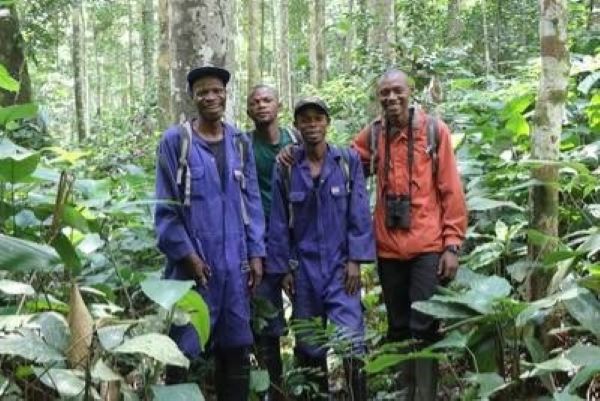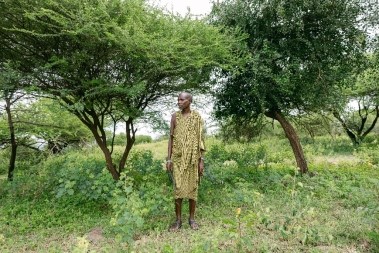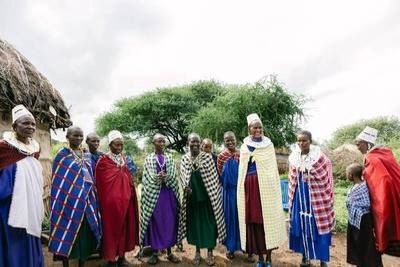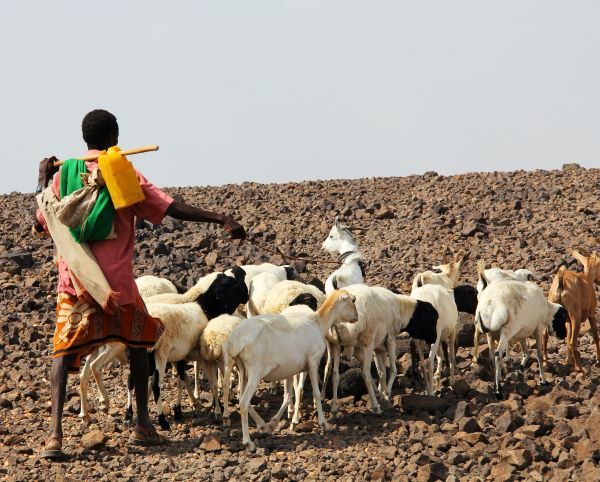
This June, to coincide with two important UN international environment days, climate solutions charity Ashden calls for more support for community-led initiatives around the world that tackle nature protection, providing evidence for its success from Tanzania, Cameroon and the Democratic Republic of Congo.
World Environment Day (5 June) and Drought and Desertification Day (17 June) are both putting a special focus on regeneration of land, and community involvement in land stewardship.
Every second, an equivalent of four football fields of healthy land becomes degraded – adding up to a total of 100 million hectares every year.
Indigenous people manage at least 25% of the planet’s land, and protect 80% of its biodiversity. Scientific evidence shows how their custodianship of land and forests is an indispensable solution to climate change. Yet this important role is largely ignored and they face pressures to clear forests for agriculture, logging, mining, land grabbing, and other illegal activities.
Ashden, which spotlights community-led initiatives through its annual Ashden Awards, points to several examples which are pioneering community-led legal challenges, protecting landscapes and nature, and the lives and livelihoods of indigenous people and local communities.
In Africa, land grabs of community land are frequently in the news, particularly for tourism, large-scale agribusiness, mining, and more recently, foreign carbon credit developers scrambling to snap up vast swathes of forested land through government deals.
“These land grabs often involve the displacement of local communities and have become known as ‘fortress conservation’ – when communities are often harassed and kicked out of their ancestral lands,” says Dawn Stevenson, Senior International Programme Manager at climate solutions charity Ashden. “But there is hope – despite the exploitation and power dynamics at play, there are local organisations supporting Indigenous communities to secure land rights very effectively through new legislation, enabling them to protect and sustainably manage the land, as well as to secure their own livelihoods.”
Power to the people – and nature
One community-led nature protection programme in Northern Tanzania – the Ujamaa Community Resource Team (UCRT) – secured an incredible 1.7million hectares of land for community use, protecting the lives and livelihoods of more than 400,000 individuals in 120 pastoralist and hunter-gatherer communities.
With the maxim ‘land is life’, UCRT’s magic tool is a novel community-led legislative procedure called Communal Certificates of Customary Rights of Occupancy (CCRO) which secure communal tenure and sustainable natural resource management.
Going from a scenario where communities had lost over 90% of their territories to agricultural expansion, now each year the project prevents over 171,700 trees from being cut and deforestation is now at zero. A vital ecosystem with diverse wildlife is being protected and populations of elephants, lions, cheetahs, wildebeest, and zebra have increased.
The first success was in 2011 when the Yaeda Valley-Lake Eyasi areas, home to the Hadzabe and Datoga communities, were able to secure the first ever Communal CCRO in Tanzania.
Through a combined effort by UCRT, international donors and the local communities, UCRT were able to get the Communal CCRO in place and reduce the rate of mass land loss.
Simitei Ngauwo, a Maasai leader from Esilalei village, said: “We’ve worked with UCRT since 2016 when we went round the village together and determined what areas should be used for agriculture, grazing, settlement and so on. They also have land experts and legal experts who worked with us to build our understanding of different laws. We worked together – we put up signs and made ownership certificates. There’s a big village certificate and three documents for grazing areas signed by our village committee and stamped by the regional land commissioner. Now no one can change the use of the areas.”

Once the Communal CCRO title has been secured, UCRT work with the pastoralist, agropastoralist and hunter gatherer communities to demarcate-land for cattle grazing and for hunting and gathering and provide trainings on sustainable and resource management. These groups are now able to secure their long-term management of the land, carrying on the nomadic lifestyle they’ve had for millenia, protecting biodiversity, and handing the land down to future generations – something that could have so easily been lost.
Paine Mako, an Indigenous Maasai woman from Northern Tanzania and the Executive Director of UCRT, said: “UCRT are bridging the gap to help communities navigate land issues, focussing on the need for clear land rights and a comprehensive free, prior and informed consent process.”
They also take on a mediator role with community-focused carbon companies that approach the communities so they can enter into fair contracts and agreements, ensuring the community’s rights are respected and engagement only happens with the community’s consent.

Now UCRT are seen as pioneers and a port of call for other organisations wanting to use the same methodology and process of securing land rights elsewhere in the country and throughout the continent.
They are also in the process of working with Berkeley University on drawing up clear guidelines so UCRT can better support communities and advocate for improved national policy and benefit sharing.
Listening is the key element of the work says Paine Mako and can’t be undervalued: “What is the people’s way of life? What can they contribute to development? If we listen, we are able to create the right solutions for development. As long as we don’t listen to the people, we will continue to create more and more conflict in our inner space where there’s already too much.”
Funding with foresight too, is essential. Despite their importance, forest communities receive less than 3% of all climate finance – a situation which needs to be resolved, says Dawn Stevenson, for the sake not just of the Indigenous communities, but for the natural resources and wildlife essential to the health of the planet.
This land is our land – other communities taking control of their land rights
Other organisations taking a pro-active and protective approach of both land and communities:
A community-led NGO Mbou Mon Tour in the Democratic Republic of Congo has also gone down the legal route to protect local land rights and has helped communities in nine villages in the Maï-Ndombe province win the status of ‘Forest Concessions of the Local Communities’ for their land, creating the first community forests in the DRC, managed entirely by the local populations. Now conservation efforts led by local people are protecting over 50,000 hectares of forest – and the future of the endangered bonobo great ape has also been secured, an animal of huge cultural importance to local communities and of global significance.
- Tropical Forest and Rural Development (TFRD), an NGO working in Cameroon. TFRD fights poverty, and protects ecosystems and endangered species, for the benefit of local communities in rural Cameroon. The organisation supports eco-tourism as the path to a sustainable future.
CERAF-Nord, a non-profit civil society organisation in Northen Cameroon, is also working with local people to restore land around Protected Areas. CERAF-Nord supports tree planting, and also trains community members in sustainable livelihoods – by producing honey, cashew nuts, shea butter and other products in and around the Benue National Park. Its approach also tackles gender inequality and inter-community tensions.








